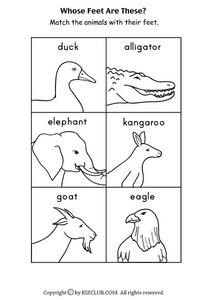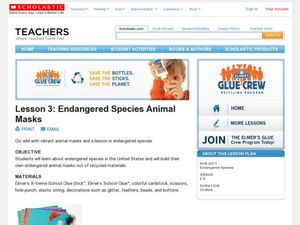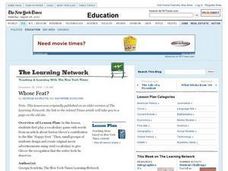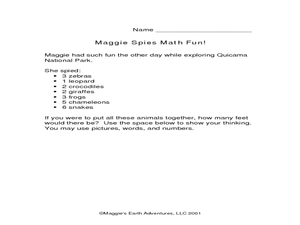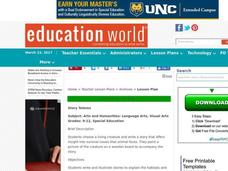Curated OER
Dinosaur Tracks and Critical Thinking
Get your young scientists excited about geology through the study of dinosaur tracks! They will use their power of observation to learn how tracks are made and use critical thinking strategies to suggest a scenario in which they were...
Curated OER
Whose Feet?
In this animal worksheet, students match each animal to its feet. Animals include an elephant, a duck, polar bear, goat, and seal.
Curated OER
Making Tracks
Students cast animal tracks on a field trip. They split up to capture tracks from different areas and use plaster of Paris to mold to the footprint. They bring casts back to class, create a negative mold and paint it black.
Curated OER
Animal Signs
Students discuss the many different types of animal signs that can be used to identify and track animals. They participate in an hands-on activity in which they examine tracks, trails, homes, territory markings, and even "scat" left by...
Curated OER
Sunken Lesson: Animal Adaptation
This animal adaptation PowerPoint provides definitions and photographs of vocabulary related to how the animals that live in particular biomes protect themselves. It also explains the cause/effect relationship between the inability of...
Howard Hughes Medical Institute
Human Feet Are Strange
Feet are neat! So, if you've already walked the path of examining animal footprints with your class, put them in the shoes of early humans! A well-designed lesson incorporates video, discussion, and hands-on learning to demonstrate how...
Curated OER
What Are the Feet Used For?
In this animal anatomy learning exercise, students analyze 5 detailed pictures of frog and amphibian feet. Students match the pictures with the function from the word bank: climbing, gripping, burrowing, swimming or gliding.
Curated OER
Echinoderms
Echinoderm structure and characteristics are the focus of this reading comprehension and labeling activity. Attractive diagrams and ample information make this a suitable homework assignment for your biology buffs when learning...
Curated OER
All About Arthropods
Use a dichotomous key to classify these squirmy bugs. A paragraph provides fifth graders with some background knowledge on the animal kingdom, and explains how to use a branching key for classification. They then determine which bugs...
Curated OER
Whose Home Is This?
After reading a short and informative paragraph on animals and their environments, learners look at pictures of four animals, and write a short description of how each one has adapted to its environment. A suggested activity is that each...
Curated OER
Of Mice and Men by John Steinbeck: Animal Imagery
Why does Steinbeck use animal imagery to describe Lennie in Of Mice and Men? Readers examine a series of descriptions and comment on the effect Steinbeck creates with his word choice.
Curated OER
Class Rules: Walking Feet
Set the stage and ground rules for your classroom with this charming presentation. Young learners will love the friendly animation and sound effects that explain to them of the rules they are to follow during the school year. Note:...
Curated OER
Paws, Claws, Hands, and Feet
In this animal hands and feet worksheet, students complete 4 pages of exercises that pertain to claws, paws, hands and feet. Students read clues and match them to the animals. Students analyze pictures of animal parts and match them to...
Curated OER
Endangered Species Animal Masks
Students research endangered animals. In this animal science lesson plan, students visit suggested websites to learn more about endangered animals and create animal masks. Students need glue, cardstock, string and feathers to construct...
Curated OER
Learning With Paint And Literature: "The Magic School Bus Gets Cold Feet"
Students create an illustration of their favorite part of the book "The Magic School Bus Gets Cold Feet" using a computer drawing program. They listen to the story and answer discussion questions, view drawings on the teacher's Paint...
Curated OER
Animal Classification
Third graders differentiate between vertebrates and invertebrates, and identify the main characteristics of mammals, fish, reptiles, amphibians, and birds. They sort and categorize different types of balls, discuss the characteristics...
Curated OER
Neat Feet
Students view a video and discuss different kinds of feet found in the animal kingdom. They make prints using paint, rubber stamps and their own feet and then measure and compare the tracks.
Curated OER
Animal Body Parts Vocabulary
In this science worksheet, learners analyze 7 pictures of animal body parts such as: tusk, claw, snout. Students read 3 word choices and circle the word that matches the picture.
Curated OER
Interdependence and Adaptation
Find out how camels and polar bears are each perfectly suited to their environments because of their physical adaptations. Several key features of each animal are discussed along with how those features work in their specific...
Curated OER
Track Traces
Students explore animal characteristics by participating in an animal anatomy activity. In this animal tracks lesson, students identify the differences between specific animals and the shape of their footprints. Students utilize a...
Curated OER
Whose Feat?
Play a vocabulary game with words from an article about Savion Glover's contribution to the film "Happy Feet." Then, small groups of young scholars design and create original movie advertisements using vivid vocabulary to give Glover the...
Curated OER
Birds - Beaks and Feet
Second graders use an online database to research information about bird's beaks and feet. Using that information, they discover what foods they eat and where they live. In groups, they cluster the food/habitat and beak/feet data to make...
Curated OER
Maggie Spies Math Fun!
In this animal feet worksheet, students add up all of the animal feetthat Maggie saw at the national park. Students add up 7 different kinds of animals, and 22 animal feet total.
Curated OER
Story Totems
Students write and illustrate a story to describe the habitat and life cycle of a selected animal. They write and publish their story, and create a picture of the animal on a wooden board.



